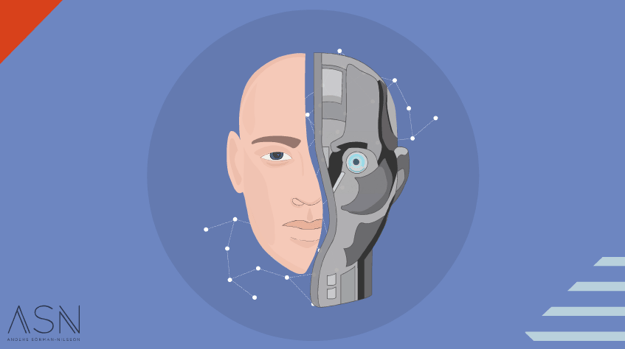Foresights and ideas that expand minds and inspire a change of heart.

The Fourth Industrial Revolution provides humanity with as many opportunities as it does challenges. As societies shape up to a world in which we increasingly connect and perform tasks through digital interfaces, everything from our relationships to our work to our home lives will be fundamentally reshaped.
Our workplaces will be unrecognisable to previous (and scarily for current) workplace generations as we rely more and more on technology to help us communicate, analyse data and formulate strategies to compete in the global marketplace. Leaders must be ready and equipped to handle this uncertain future, and they need to give their talent – their staff – the best opportunity to thrive.
Inevitably, many people are sceptical about what needs to happen in their workplace. Regardless of their industry, they may be scared technology is coming to “steal” their jobs - technological unemployment. Others will try to sabotage or detract from transformation moves to immerse technology into their work practices.
All of this presents a test for leaders looking to take staff on this change journey. As we know, culture eats strategy for breakfast. To succeed, leaders have to win this culture war. They have to win the hearts and minds of humans.
When I speak to companies, what comes up all the time is how leaders can step up and face this challenge in an uncertain world dominated by technological change. If they want to succeed, I believe leaders need to reassess what leadership means. They need to become the company’s “Chief Storytelling Officer” by helping their staff understand – and buy into – a future where technology and human creativity work hand-in-hand to maximise both productivity and job satisfaction.
The most important genre for these “Chief Storytelling Officers” will be science fiction. I, for one, think the best leaders have a lot in common with science fiction authors. They create a narrative that allows readers to suspend their grip on reality by taking them on a grand odyssey into Tomorrowland. They sell a vision that’s both credible and relatable. They prepare the ground for people to adapt to change. In other words, they show them what’s possible, and where a successful narrative (also known as strategy) might take them.
Leaders who do this can show technology is an enabler, not a monster. The staff who buy into the vision understand robots will allow them to show more of their creativity, humanity and ingenuity by taking over many of the things they dislike about their work. Technology and automation might in fact ‘take the robot out of the human Talented workers who be’. For too long have we wasted time doing data entry, punching spreadsheets, and done menial work. Human people who believe in the leader's narrative don't just see this era as a time to reskill – they see a technology-rich future creating enormous opportunities for them.
I’ve said it before: efficiency is for robots, creativity is for humans. Employers are increasingly demanding employees with excellent soft skills. They want people who are creative and have the ability to solve problems, influence and innovate. These are all “right-brained” skills, as defined by human brain dominance theory. (With clients, I often use the Hermann Brain Dominance Instrument, which helps staff identify their thinking preferences when it comes to communicating effectively or making better decisions.)
The Fourth Industrial Revolution comes with a range of technologies that are distinctly “left brain”: machine learning, robotics, 3D printing, big data analytics. They are focused on logical processes: massive data processing power, mathematics and analytics.
The technologies shaping the new age are overwhelmingly good at “left-brain” tasks. Artificial intelligence, for instance, can do coding and will build software for us. It can do these and other things brilliantly at lightning speed. That’s why my analysis is that, in life and at work, we need to focus on improving what we’re already good at (but have perhaps forgotten in our corporate factories) – our fundamental human skills.
One of the things often left out of the conversation when talking about technologies is how they will help “take the robot out of the human”. Despite (or perhaps because of) previous industrial revolutions, we actually do a lot of work that's boring and very robotic. It’s menial work that’s beneath us as thinking, feeling humans.
That’s why I disagree with the fascination governments have for wanting more of our kids to do STEM subjects (science, technology, engineering and maths). That’s no way to prepare children for the jobs of the future. Unless those STEM subjects are taught with an equal emphasis on humanity and empathy, we run the risk of equipping them with skills technology already handles with ease, and will certainly surpass us as in the future.
Why on earth would we educate our kids into unemployment?
Being a storytelling leader with a specialisation in science fiction is an example of how we need to nurture our most treasured human qualities and imagine a better tomorrow. We can all be great storytellers and dreamers. It’s innate for humans. To be successful at it, though, takes emotional intelligence – a cognitive skill that computers and robots will take a very long time to learn for themselves.
Thus, as a humble futurist, I encourage you to take your science fiction story-telling to the next level and see whether it might just give you more buy-in from your teams into the strategic vision you are painting beyond the horizon. Only when they accept the narrative arc you are drawing will they make a trust leap and truly follow you on that odyssey.

Header Text
Lorem ipsum dolor sit amet, consectetur adipiscing elit, sed do eiusmod tempor incididunt ut labore et dolore magna aliqua. Ut enim ad minim veniam, quis nostrud exercitation ullamco laboris nisi ut aliquip ex ea commodo consequat. Duis aute irure dolor in reprehenderit in voluptate velit esse cillum dolore eu fugiat nulla pariatur.
Lorem ipsum dolor sit amet, consectetur adipiscing elit, sed do eiusmod tempor incididunt ut labore et dolore magna aliqua. Ut enim ad minim veniam, quis nostrud exercitation ullamco laboris nisi ut aliquip ex ea commodo consequat. Duis aute irure dolor in reprehenderit in voluptate velit esse cillum dolore eu fugiat nulla pariatur.
Lorem ipsum dolor sit amet, consectetur adipiscing elit, sed do eiusmod tempor incididunt ut labore et dolore magna aliqua. Ut enim ad minim veniam, quis nostrud exercitation ullamco laboris nisi ut aliquip ex ea commodo consequat. Duis aute irure dolor in reprehenderit in voluptate velit esse cillum dolore eu fugiat nulla pariatur.

Header Text
Lorem ipsum dolor sit amet, consectetur adipiscing elit, sed do eiusmod tempor incididunt ut labore et dolore magna aliqua. Ut enim ad minim veniam, quis nostrud exercitation ullamco laboris nisi ut aliquip ex ea commodo consequat. Duis aute irure dolor in reprehenderit in voluptate velit esse cillum dolore eu fugiat nulla pariatur.
Lorem ipsum dolor sit amet, consectetur adipiscing elit, sed do eiusmod tempor incididunt ut labore et dolore magna aliqua. Ut enim ad minim veniam, quis nostrud exercitation ullamco laboris nisi ut aliquip ex ea commodo consequat. Duis aute irure dolor in reprehenderit in voluptate velit esse cillum dolore eu fugiat nulla pariatur.
Lorem ipsum dolor sit amet, consectetur adipiscing elit, sed do eiusmod tempor incididunt ut labore et dolore magna aliqua. Ut enim ad minim veniam, quis nostrud exercitation ullamco laboris nisi ut aliquip ex ea commodo consequat. Duis aute irure dolor in reprehenderit in voluptate velit esse cillum dolore eu fugiat nulla pariatur.

Header Text
Lorem ipsum dolor sit amet, consectetur adipiscing elit, sed do eiusmod tempor incididunt ut labore et dolore magna aliqua. Ut enim ad minim veniam, quis nostrud exercitation ullamco laboris nisi ut aliquip ex ea commodo consequat. Duis aute irure dolor in reprehenderit in voluptate velit esse cillum dolore eu fugiat nulla pariatur.
Lorem ipsum dolor sit amet, consectetur adipiscing elit, sed do eiusmod tempor incididunt ut labore et dolore magna aliqua. Ut enim ad minim veniam, quis nostrud exercitation ullamco laboris nisi ut aliquip ex ea commodo consequat. Duis aute irure dolor in reprehenderit in voluptate velit esse cillum dolore eu fugiat nulla pariatur.
Lorem ipsum dolor sit amet, consectetur adipiscing elit, sed do eiusmod tempor incididunt ut labore et dolore magna aliqua. Ut enim ad minim veniam, quis nostrud exercitation ullamco laboris nisi ut aliquip ex ea commodo consequat. Duis aute irure dolor in reprehenderit in voluptate velit esse cillum dolore eu fugiat nulla pariatur.
& STAY UP TO DATE WITH FORESIGHTS AND TREND REPORTS!
WE WILL EQUIP YOU WITH THE VIDEOS AND MATERIALS YOU NEED TO SUCCESSFULLY PITCH ASN.
0 Comment